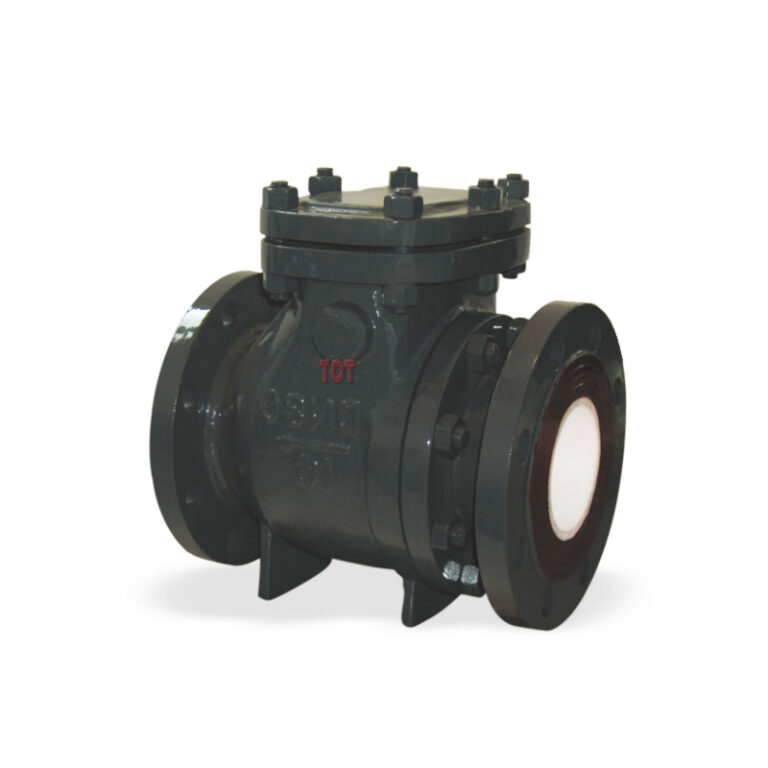Ceramic Check Valves
Ceramic check valve is a ceramic lined valve, it works like other metal check valves, only allows one-way flow and prevents reverse flow, but its internal disc and seat parts that contact the fluid are made of industrial grade ceramics, such as aluminum oxide (Al₂O₃) or zirconium oxide (ZrO₂).
We originally designed and manufactured ceramic check valves because of its excellent corrosion resistance, wear resistance and thermal stability, which can ensure its service life in harsh working environments.
Whether you install it vertically or horizontally, ceramic check valves are ideal for slurries, ash, tailings, acidic solutions, alkaline solutions and corrosive chemicals.
TOT Valve not only assembles valves, we also produce precision ceramic components in-house. As a manufacturer focusing on harsh industrial valves, we control quality from the core. All valves are manufactured according to strict quality procedures, manufactured in accordance with API 6D / ISO standards, and 100% passed the sealing performance, crack resistance, hydrostatic strength, corrosion resistance tests.
When your system faces the triple threat of high wear, chemical corrosion and backflow risk, tell us your operating conditions and we’ll recommend the right solution for you—no guesswork, just proven performance.
Contact us today so we can protect your equipment, reduce maintenance downtime and maximize reliability.
Be careful when choosing a new valve supplier, the disappointment of poor quality can last much longer than the joy of a low price!
Technical Specifications
| Parameter | Range / Options |
| Size Range | DN100 to DN600 (4″–24″) |
| Pressure Rating | PN10, PN16 / ANSI Class 150, 300 |
| Temperature | Up to 250°C (depending on ceramic) |
| Flow Direction | Only one direction and prevents reverse flow |
| Body Materials | WCB, CF8, CF8M, Duplex, etc. |
| Ceramic Materials | 95%–99.5% Alumina, Zirconia, SiC (custom) |
| End Connection | Flanged (RF), Wafer, Threaded (on request) |
TOT Valve also offers custom design support for non-standard connections, unusual media, or installation limitations.
Ceramic Check Valve Types Available
TOT Valve offers multiple types of ceramic check valves to meet your system layout and fluid characteristics:
- Lift Type Ceramic Check Valve: Ideal for horizontal pipelines, vertical lift motion of ceramic disc, tight shut-off for high-pressure systems
- Swing Type Ceramic Check Valve: Best for larger diameters, uses gravity or flow force to swing ceramic disc open/closed, suitable for moderate flow speeds
- Ball Type Ceramic Check Valve: Compact design for vertical or inclined pipes, uses a floating ceramic ball for sealing, great for high-viscosity or particle-laden flows
- Wafer Type Ceramic Check Valve: Ultra-thin, fits between flanges, easy installation and removal, ideal for space-constrained systems
Each design comes with standardized flange dimensions (ANSI / DIN / JIS) and can be customized with different ceramic grades and body materials based on your application.
Ceramic vs. Metal Check Valves
| Feature | Ceramic Check Valve | Metal Check Valve |
| Wear Resistance | ★★★★★ | ★★☆☆☆ |
| Corrosion Resistance | ★★★★★ | ★★★☆☆ |
| Operating Life | 3–5x longer | Shorter in abrasive/corrosive media |
| Seal Integrity | Maintains over time | Prone to pitting & leakage |
| Suitable for Solids | Yes (slurries, ash) | No (high wear risk) |
| Cost | Higher upfront, lower lifetime cost | Lower upfront, frequent replacement |
If your process involves silica, fly ash, limestone slurry, or mixed chemicals, ceramic valves are not a luxury — they’re a necessity.
Where Ceramic Check Valves Make the Biggest Difference
You’re dealing with more than just liquid flow — your pipelines carry abrasive slurries, chemical cocktails, and suspended solids. That’s why industries across the globe rely on ceramic check valves:
- Mining & Minerals: Slurry lines, tailings return, abrasive ore transport, withstands quartz, silica, and heavy solids
- Power Generation: FGD (flue gas desulfurization) systems, handles lime slurry, gypsum slurry, fly ash
- Chemical Processing: Acids (HCl, H₂SO₄), alkalis (NaOH), chlorides, long-term sealing in corrosive processes
- Pulp & Paper: Fiber-rich fluids, black liquor, resists clogging and wear
- Wastewater Treatment: Abrasive sludge, chemical neutralization, long cycle life in aggressive effluent
If you’ve been replacing metal valves every few months, a switch to ceramic can slash your maintenance costs by over 50%.
Ready to ensure reliable, wear-resistant fluid control? Contact us today for a ceramic check valve solution tailored to your needs.
* We are not just providing simple quotes but experts in selection, calculation, and drawing.
FAQ
You’ll find ceramic check valves in:
- Mining (slurry, tailings)
- Power plants (FGD systems)
- Chemical processing (acids, alkalis)
- Paper & pulp
- Wastewater treatment
That depends on the medium and operating conditions, but in many abrasive or corrosive environments, ceramic check valves last 3–5 times longer than metal ones. Some customers report up to 2 years of continuous operation without performance drop.
One of the biggest advantages is minimal maintenance. Unlike metal valves that require frequent inspection and reseating, ceramic valves maintain tight sealing with little wear. Just ensure the system avoids pressure shock and follow basic flushing/cleaning protocols.
To recommend the right valve and give you an accurate quote, please share:
- Valve type (lift, swing, ball, etc.)
- Size and pressure rating
- Working temperature
- Medium (composition, solids, pH)
- Connection standard (ANSI/DIN/JIS)
- Quantity
Yes, in most cases. TOT ceramic check valves are designed to match common industry standards (ANSI, DIN, JIS) for flange dimensions and face-to-face length. If your system requires custom sizing or connections, we offer **tailored solutions** to ensure easy integration.
If your process involves abrasive particles or aggressive chemicals, a metal valve will degrade quickly due to wear and corrosion. Ceramic check valves use advanced materials like alumina or zirconia that offer superior hardness, chemical resistance, and sealing performance, giving you a significantly longer service life and fewer shutdowns.


